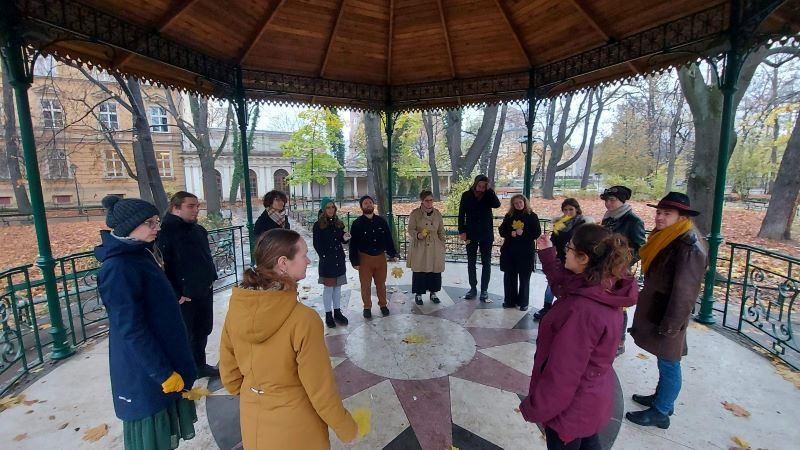LARP for Climate: Life Action Role Playing for climate literacy

Meet Zbigniew Janczukowicz, the initiator of LARP for Climate, an Erasmus + project that grew out of a local branch of Fridays for Future in Krakow, Poland. LARP (Life Action Role Playing) games on climate change and political action seek to increase climate literacy among young people. The project was developed with partners from Estonia, Greece, and Norway and counts by now more than 2000 participants in 10 countries. Translations of the games are available in several languages.
Could you give us some examples of the games that you have developed so far?
The first game we created was Climate Perspectives, a diplomatic game where players take the role of politicians and journalists in the year 2050 evaluating climate change efforts. Since then, we have created a variety of games for different age groups responding to locally relevant challenges of our partner countries. Our Norwegian partner created a game called Ceremony for Hope, which facilitates discussion and reflection on climate grief. Our Greek partner developed The Reservoir, an outdoor game on water scarcity, which is set in post-apocalyptic times with players competing for water to survive. Our Estonian partners designed a game called A Tree of Life. Players symbolise small creatures living on a tree. When the tree gets sick nobody knows why because everyone only knows about one part of the tree. So, players need to cooperate to see the bigger picture. In Poland, there is The Golden Sun, a new game on greenwashing in the media. The players are supposed to be journalists who compete for jobs by using climate change as clickbait for articles. 16-year-olds are surprisingly good at this because they are constantly exposed to greenwashing in their daily life.
Which challenges did you face along the way? And how did you address them ?
One of the initial challenges was bridging the communities of LARP game designers with those of climate activists and teachers. For the former, LARP is often a mere hobby. From the perspective of the teachers and activists, LARP looked complicated. While being part of the LARP community, and with our training and teaching background, we were able to act as connectors and adapt our events and trainings to the different audiences.
Another challenge was writing easily understandable instructions for someone who had never facilitated a LARP game. We spent long hours discussing and testing different formulations to be able to make it as accessible as possible.
Sometimes, challenges turn into opportunities. Two years ago, the city of Krakow asked us to present LARP at a big movie festival. However, the crowded setting with a food truck on the one side and a movie screen on the other was less than ideal for a LARP game because it needs space and time to build trust between players. So, we developed shorter festival approved versions of two of our games in which players only interact with the game for 15 minutes. It turned out be a great success!
How have you experienced scaling up the project and working with different partners across Europe?
The value of having partners from all over Europe is the diversity they introduce to the game design. In the Norwegian context the cold North is in focus while the Greeks deal with heatwaves. These differences are reflected in the games and characters. However, there have also been disagreements about the definition of what constitutes a LARP game across countries. This was difficult to navigate at times.
What do you hope to achieve in the coming years?
We are currently at the multiplier stage where we look for tools to spread the games and reach more educators. We are planning workshops on how to facilitate and organise the games and we are creating a database of non-digital games on sustainability. We also plan to connect our games more directly to the competences in the GreenComp framework and to develop training material on how to teach GreenComp to game designers in a digestible and understandable manner.
What is one thing everyone could learn from your project?
LARP offers a way to put yourself into someone else’s shoes, get used to thinking from a different perspective, and understand that nobody is fully right, and everyone only knows a part of the full picture.
Find out more about LARP for Climate – Fundacja Edukacyjna Nausika.
Additional information
-
Evidence:N/A
-
Funding source:Erasmus+
-
Intervention level:N/A
-
Intervention intensity:N/A
-
Participating countries:EstoniaGreeceNorwayPoland
-
Target audience ISCED:Lower secondary education (ISCED 2)Upper secondary education (ISCED 3)Post-secondary non-tertiary education (ISCED 4)
